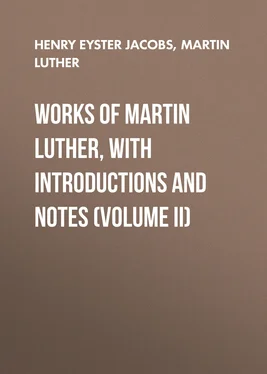Henry Eyster Jacobs - Works of Martin Luther, with Introductions and Notes (Volume II)
Здесь есть возможность читать онлайн «Henry Eyster Jacobs - Works of Martin Luther, with Introductions and Notes (Volume II)» — ознакомительный отрывок электронной книги совершенно бесплатно, а после прочтения отрывка купить полную версию. В некоторых случаях можно слушать аудио, скачать через торрент в формате fb2 и присутствует краткое содержание. Жанр: foreign_prose, foreign_religion, Философия, foreign_psychology, foreign_antique, на немецком языке. Описание произведения, (предисловие) а так же отзывы посетителей доступны на портале библиотеки ЛибКат.
- Название:Works of Martin Luther, with Introductions and Notes (Volume II)
- Автор:
- Жанр:
- Год:неизвестен
- ISBN:нет данных
- Рейтинг книги:3 / 5. Голосов: 1
-
Избранное:Добавить в избранное
- Отзывы:
-
Ваша оценка:
- 60
- 1
- 2
- 3
- 4
- 5
Works of Martin Luther, with Introductions and Notes (Volume II): краткое содержание, описание и аннотация
Предлагаем к чтению аннотацию, описание, краткое содержание или предисловие (зависит от того, что написал сам автор книги «Works of Martin Luther, with Introductions and Notes (Volume II)»). Если вы не нашли необходимую информацию о книге — напишите в комментариях, мы постараемся отыскать её.
Works of Martin Luther, with Introductions and Notes (Volume II) — читать онлайн ознакомительный отрывок
Ниже представлен текст книги, разбитый по страницам. Система сохранения места последней прочитанной страницы, позволяет с удобством читать онлайн бесплатно книгу «Works of Martin Luther, with Introductions and Notes (Volume II)», без необходимости каждый раз заново искать на чём Вы остановились. Поставьте закладку, и сможете в любой момент перейти на страницу, на которой закончили чтение.
Интервал:
Закладка:
Even though a miracle were to be done in the pope's behalf against the temporal powers, or though someone were to be stricken with a plague—which they boast has sometimes happened—it should be considered only the work of the devil, because of the weakness of our faith in God. Christ Himself prophesied in Matthew xxiv: "There shall come in My Name false Christs and false prophets, and do signs and wonders, so as to deceive even the elect," [Matt. 24:24] and Paul says in II Thessalonians ii, that Antichrist shall, through the power of Satan, be mighty in lying wonders [2 Thess. 2:9]. Let us, therefore, hold fast to this: No Christian authority can do anything against Christ; as St. Paul says, "We can do nothing against Christ, but for Christ." [2 Cor. 13:8] Whatever does aught against Christ is the power of Antichrist and of the devil, even though it were to rain and hail wonders and plagues. Wonders and plagues prove nothing, especially in these last evil times, for which all the Scriptures prophesy false wonders [2 Thess. 2:9 f.]. Therefore we must cling with firm faith to the words of God, and then the devil will cease from wonders.
Thus I hope that the false, lying terror with which the Romans have this long time made our conscience timid and stupid, has been allayed. They, like all of us, are subject to the temporal sword; they have no power to interpret the Scriptures by mere authority, without learning; they have no authority to prevent a council or, in sheer wantonness, to pledge it, bind it, or take away its liberty; but if they do this, they are in truth the communion of Antichrist and of the devil, and have nothing at all of Christ except the name.
We shall now look at the matters which should be discussed in the councils, and with which popes, cardinals, bishops and all the scholars ought properly to be occupied day and night if they loved Christ and His Church. But if they neglect this duty, then let the laity 138 138 Der Haufe , i. e. Christians considered en masse , without regard to official position in the Church.
and the temporal authorities see to it, regardless of bans and thunders; for an unjust ban is better than ten just releases, and an unjust release worse than ten just bans. Let us, therefore, awake, dear Germans, and fear God rather than men [Acts 5:29], that we may not share the fate of all the poor souls who are so lamentably lost through the shameful and devilish rule of the Romans, in which the devil daily takes a larger and larger place,—if, indeed, it were possible that such a hellish rule could grow worse, a thing I can neither conceive nor believe.
[Sidenote: Worldliness of the pope]
1. It is a horrible and frightful thing that the ruler of Christendom, who boasts himself vicar of Christ and successor of St. Peter, lives in such worldly splendor that in this regard no king nor emperor can equal or approach him, and that he who claims the title of "most holy" and "most spiritual" is more worldly than the world itself. He wears a triple crown, when the greatest kings wear but a single crown 139 139 The papal crown dates from the XI Century; the triple crown, or tiara, from the beginning of the XIV. It was intended to signify that very superiority of the pope to the rulers of this world, of which Luther here complains. See Realencyk. , X, 532, and literature there cited.
; if that is like the poverty of Christ and of St. Peter, then it is a new kind of likeness. When a word is said against it, they cry out "Heresy!" but that is because they do not wish to hear how unchristian and ungodly such a practice is. I think, however, that if the pope were with tears to pray to God, he would have to lay aside these crowns, for our God can suffer no pride; and his office is nothing else than this,—daily to weep and pray or Christendom, and to set an example of all humility.
However that may be, this splendor of his is an offence, and the pope is bound on his soul's salvation to lay it aside, because St. Paul says, "Abstain from all outward shows, which give offence," [1 Thess. 5:21] and in Rom. xii, "We should provide good, not only in the sight of God, but also in the sight of all men." [Rom. 12:17] An ordinary bishop's crown would be enough for the pope; he should be greater than others in wisdom and holiness, and leave the crown of pride to Antichrist, as did his predecessors several centuries ago. They say he is a lord of the world; that is a lie; for Christ, Whose vicar and officer he boasts himself to be, said before Pilate, "My kingdom is not of this world," [John 17:36] and no vicar's rule can go beyond his lord's. Moreover he is not the vicar of the glorified, but of the crucified Christ, as Paul says, "I was willing to know nothing among you save Christ, and Him only as the Crucified" [1 Cor. 2:2]; and in Philippians ii, "So think of yourselves as ye see in Christ, Who emptied Himself and took upon Him the appearance of a servant" [Phil. 2:5]; and again in I Corinthians i, "We preach Christ, the Crucified." [1 Cor. 1:23] Now they make the pope a vicar of the glorified Christ in heaven, and some of them have allowed the devil to rule them so completely that they have maintained that the pope is above the angels in heaven and has authority over them 140 140 A statement made by Augustinus Triumphus. See above, p. 73, note 5; and below, p. 246.
. These are indeed the very works of the very Antichrist.
[Sidenote: The Cardinals]
2. What is the use in Christendom of those people who are called the cardinals? I shall tell you. Italy and Germany have many rich monasteries, foundations, benefices, and livings. No better way has been discovered to bring all these to Rome than by creating cardinals and giving them the bishoprics, monasteries and prelacies, and so overthrowing the worship of God. For this reason we now see Italy a very wilderness—monasteries in ruins, bishoprics devoured, the prelacies and the revenues of all the churches drawn to Rome, cities decayed, land and people laid waste, because there is no more worship or preaching. Why? The cardinals must have the income 141 141 The Cardinal della Rovere, afterwards Pope Julius II, held at one time the archbishopric of Avignon, the bishoprics of Bologna, Lausanne, Coutances, Viviers, Mende, Ostia and Velletri, and the abbacies of Nonantola and Grottaferrata. This is but one illustration of the scandalous pluralism practised by the cardinals. Cf. Lea, in Cambridge Mod. Hist. , I, pp. 650 f.
. No Turk could have so devastated Italy and suppressed the worship of God.
Now that Italy is sucked dry, they come into Germany 142 142 The complaint that the cardinals were provided with incomes by appointment to German benefices goes back to the Council of Constance (1415). C. Benrath, p. 87, note 17.
, and begin oh, so gently. But let us beware, for Germany will soon become like Italy. Already we have some cardinals; what the Romans seek by that the "drunken Germans" are not to understand until we have not a bishopric, a monastery, a living, a benefice, a heller or a pfennig left. Antichrist must take the treasures of the earth, as it was prophesied [Dan. 11:39, 43]. So it goes on. They skim the cream of the bishoprics, monasteries and benefices, and because they do not yet venture to turn them all to shameful use, as they have done in Italy, they only practise for the present the sacred trickery of coupling together ten or twenty prelacies and taking a yearly portion from each of them, so as to make a tidy sum after all. The priory of Würzburg yields a thousand gulden ; that of Bamberg, something; Mainz, Trier and the others, something more; and so from one to ten thousand gulden might be got together, in order that a cardinal might live at Rome like a rich king.
Интервал:
Закладка:
Похожие книги на «Works of Martin Luther, with Introductions and Notes (Volume II)»
Представляем Вашему вниманию похожие книги на «Works of Martin Luther, with Introductions and Notes (Volume II)» списком для выбора. Мы отобрали схожую по названию и смыслу литературу в надежде предоставить читателям больше вариантов отыскать новые, интересные, ещё непрочитанные произведения.
Обсуждение, отзывы о книге «Works of Martin Luther, with Introductions and Notes (Volume II)» и просто собственные мнения читателей. Оставьте ваши комментарии, напишите, что Вы думаете о произведении, его смысле или главных героях. Укажите что конкретно понравилось, а что нет, и почему Вы так считаете.












